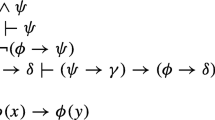Abstract
Classical logic rests on the assumption that there are two mutually exclusive and jointly exhaustive truth values. This assumption has always been surrounded by philosophical controversy. Doubts have been raised about its legitimacy, and hence about the legitimacy of classical logic. Usually, the assumption is stated in the form of a general principle, namely the principle that every proposition is either true or false. Then, the philosophical controversy is often framed in terms of the question whether every proposition is either true or false. The main purpose of the paper is to show that there is something wrong in this way of putting things. The point is that the common way of understanding the controversial assumption is misconceived, as it rests on a wrong picture of propositions. In the first part of the paper I outline this picture and I argue against it. In the second part I sketch a different picture of propositions and I suggest how this leads to conceive the issue of classical logic in different terms.
Similar content being viewed by others
References
Austin, J. L.: 1961) ‘The Meaning of a Word’, in Philosophical Papers, Oxford University Press, Oxford.
M.J. Cresswell (1973) Logics and Language Methuen & Co London
M. Dummett (1978) Truth and Other Enigmas Harvard University Press Cambridge MA
A. C. Grayling (1982) An Introduction to Philosophical Logic Blackwell Oxford
S. Haack (1978) ‘Philosophy of Logics Cambridge University Press Cambridge
P. Horwich (1998) Truth EditionNumber2 Clarendon Press Oxford
Iacona, A. 2002, Propositions, Genoa.
J. Lukasiewicz (1970) Selected Works North-Holland Publishing Company Amsterdam and London
C. Peacocke (1992) A Study of Concepts MIT Press Cambridge, MA
S. Read (1995) Thinking About Logic Oxford University Press Oxford
N. Rescher (1969) Many-Valued Logic McGraw-Hill New York
J. Searle (1978) ArticleTitle‘Literal Meaning’ Erkenntnis 13 207–224 Occurrence Handle10.1007/BF00160894
C. Travis (1981) The True and the False John Benjamins Amsterdam
C. Travis (1994) ‘On being Truth-Valued’ S. L. Tsohatzidis (Eds) Foundations of Speech Act Theory Routledge London 167–186
C. Travis (1999) ‘Sublunary Intuitionism’ P. Sullivan J. Brandle (Eds) New Essays on the Philosophy of Michael Dummett Rodopi Vienna
F. Waismann (1951) ‘Verifiability’ A. Flew (Eds) Logic and Language Blackwell Oxford 117–144
T. Williamson (1994) Vagueness Routledge London
L. Wittgenstein (1953) Philosophische Untersuchungen Blackwell Oxford
C. Wright (1992) Truth and Objectivity Harvard University Press Cambridge, MA
Rights and permissions
About this article
Cite this article
Iacona, A. Rethinking Bivalence. Synthese 146, 283–302 (2005). https://doi.org/10.1007/s11229-005-6237-7
Issue Date:
DOI: https://doi.org/10.1007/s11229-005-6237-7



